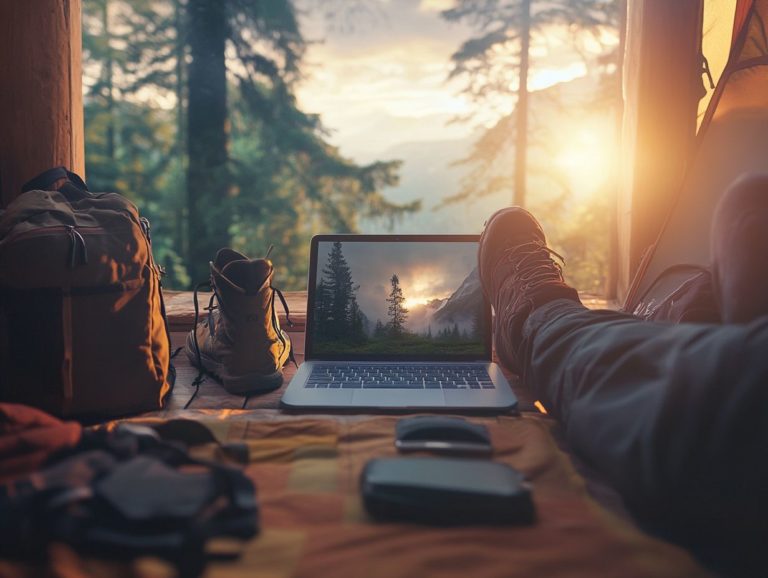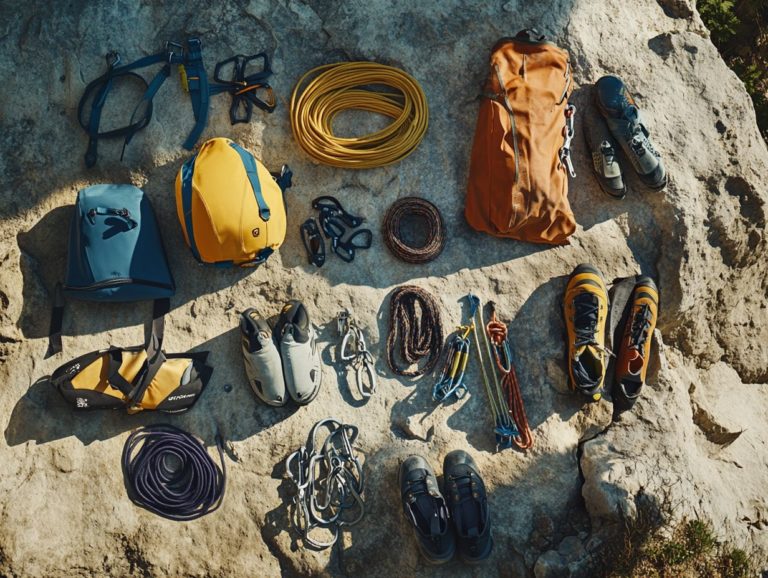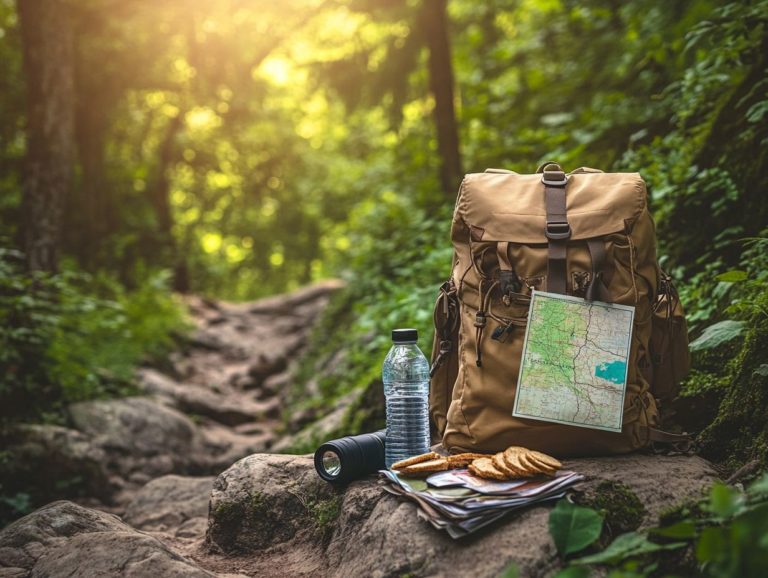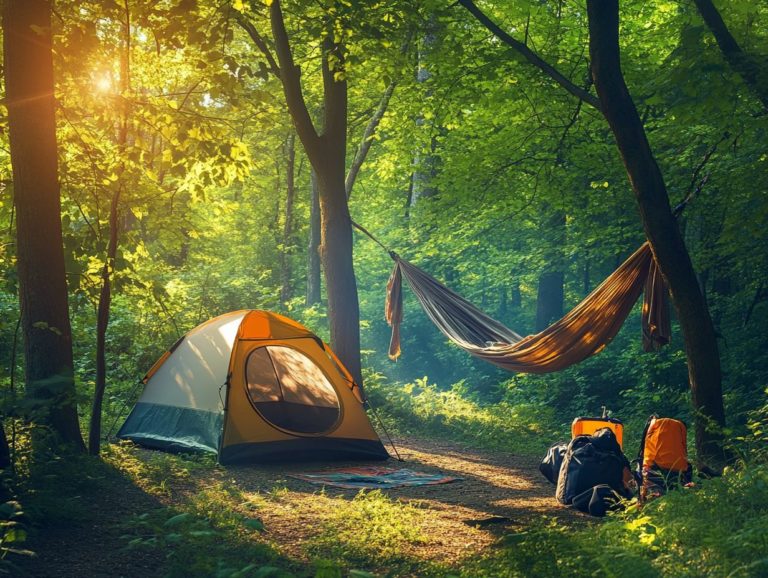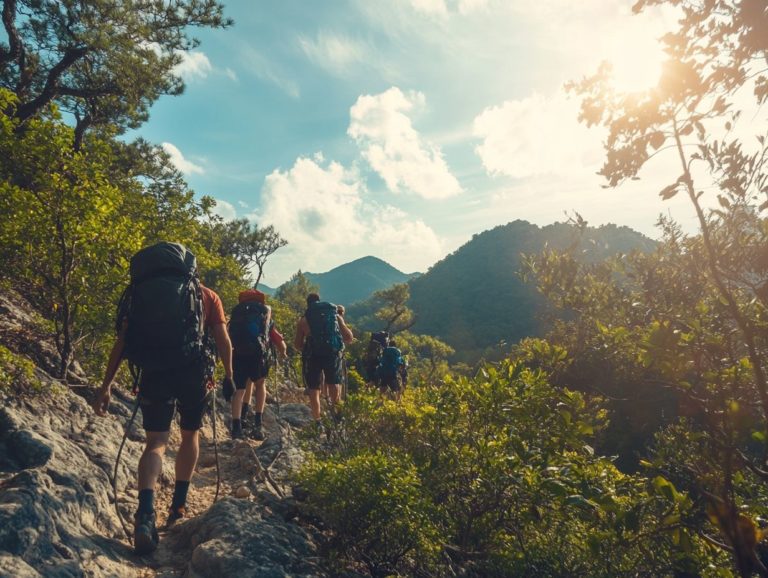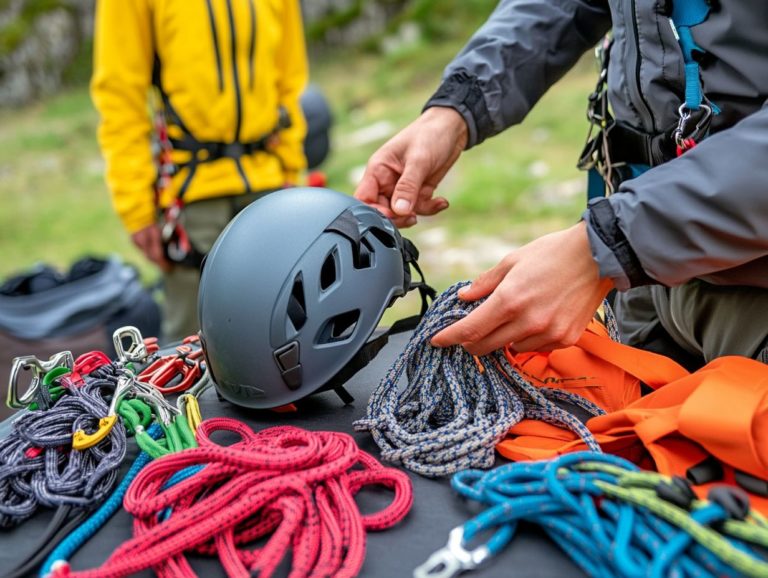How to Clean Your Camping Equipment?
Cleaning your camping equipment may not be the first item on your to-do list, but it s essential for prolonging the life and performance of your gear.
This article delves into the myriad benefits of regular cleaning, ranging from maintaining hygiene to boosting durability. You ll uncover must-have cleaning supplies and expert tips for tackling various types of equipment, including tents, sleeping bags, and cooking gear. You will also learn the best practices for storing your gear after thorough cleaning. Get ready to take on your next adventure with confidence!
Contents
- Key Takeaways:
- Why Cleaning Your Camping Equipment is Important
- Essential Cleaning Supplies
- Cleaning Different Types of Camping Equipment
- Tents
- Sleeping Bags
- Cooking Gear
- Other Gear and Accessories
- Tips for Efficient and Thorough Cleaning
- Storing Clean Camping Equipment
- Frequently Asked Questions
- How to Clean Your Camping Equipment?
- What should I use to clean my camping equipment?
- How often should I clean my camping equipment?
- Can I put my camping gear in the washing machine?
- Do I need to dry my camping equipment after cleaning?
- How do I remove stubborn stains or odors from my camping gear?
- Is it necessary to clean my camping equipment before storing it?
Key Takeaways:

- Clean your camping equipment regularly to extend its lifespan and ensure a safe and enjoyable outdoor experience.
- Gather essential cleaning supplies, including mild soap, water, and a soft brush or cloth. Avoid harsh chemicals that can damage materials.
- Use proper techniques, such as spot cleaning and letting your gear air dry, to maintain the quality of different types of camping gear.
Why Cleaning Your Camping Equipment is Important
Cleaning your camping equipment is crucial for ensuring its longevity and functionality. Neglecting maintenance of items like tents, sleeping bags, and cooking gear can lead to serious issues, such as mildew and moisture damage.
When your gear is well-maintained, it enhances your camping experience and reduces the risk of health hazards associated with dirty equipment. By taking time to ensure your camping essentials are clean before storage, you re gearing up for an unforgettable adventure, fully prepared to tackle the great outdoors with confidence.
Benefits of Regular Cleaning
Regularly cleaning your camping gear extends its lifespan and ensures you re always ready for your next outdoor escapade. This allows you to immerse yourself in the beauty of nature without the burden of dirty equipment.
By committing to a routine maintenance schedule, you can significantly enhance the performance of your gear. For example, organizing your bins simplifies both packing and unpacking, making it easy to find what you need when setting up camp.
A thorough cleaning removes harmful debris that can lead to wear and tear, boosting your gear s durability. By taking proactive steps, you protect your investment and cultivate a more enjoyable camping experience, enabling you to focus on the wonders of nature rather than grappling with equipment failures or disarray.
Essential Cleaning Supplies
Having the right cleaning supplies is vital for effectively maintaining your camping gear be it your sleeping bag, tent, or cooking equipment. This careful approach ensures that each item receives the attention it deserves, preserving both its functionality and appearance for your future adventures.
Must-Have Items for Cleaning
To effectively clean your camping gear, gather a few essential items: a microfiber cloth, gentle soap, and a reliable water jug. These tools are crucial for removing dirt and moisture, preserving the longevity and performance of your outdoor equipment. Neglecting this can lead to unnecessary wear and tear over time.
A microfiber cloth is your best friend here; it traps dust and grime without scratching surfaces, making it perfect for delicate items like tents or camping stoves. Gentle soap works wonders on stubborn stains, breaking them down without compromising the integrity of fabrics or materials. When rinsing, a dependable water jug provides a steady source of clean water, simplifying the process and allowing for thorough rinses as needed.
Together, these items create a robust cleaning arsenal that every outdoor enthusiast should have at their disposal.
Cleaning Different Types of Camping Equipment
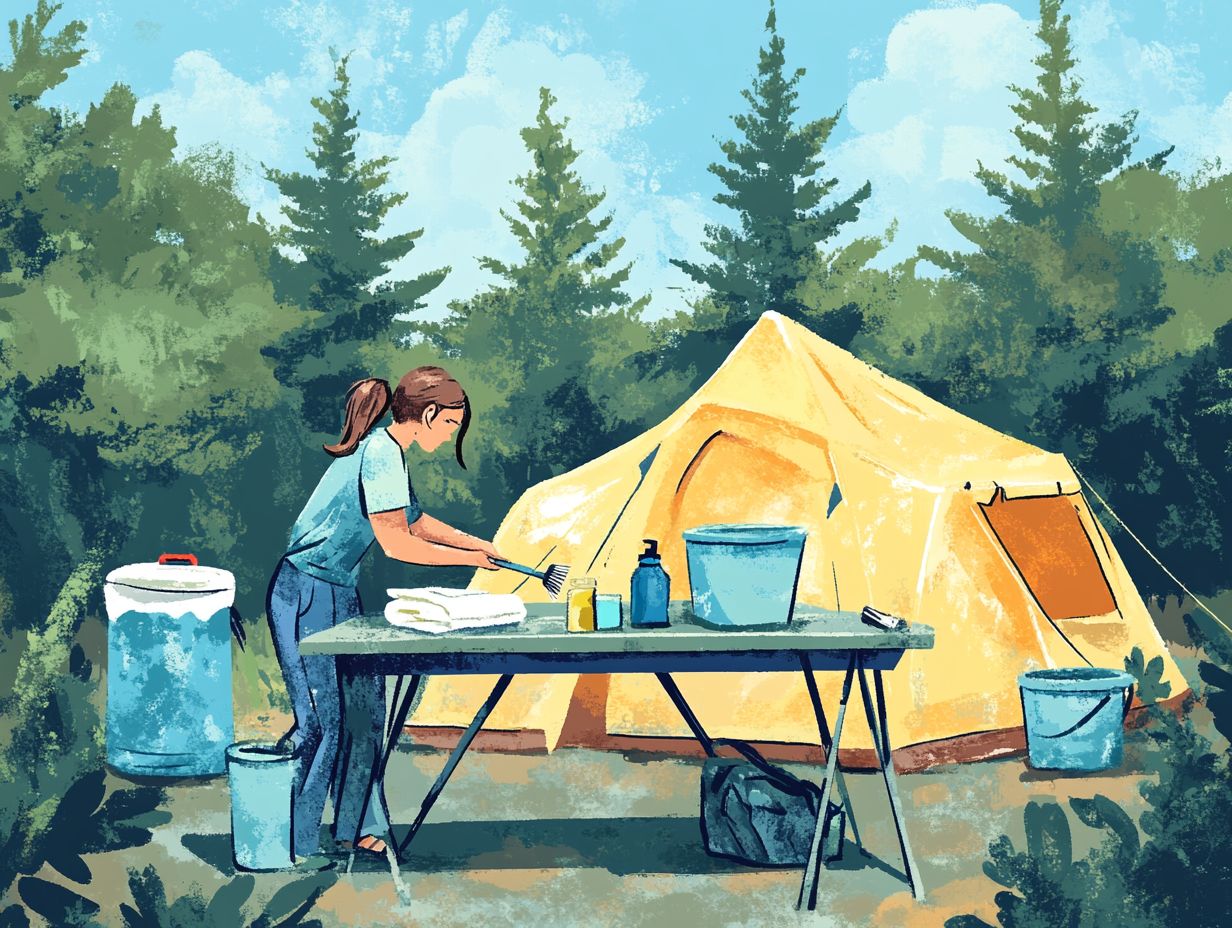
Cleaning various types of camping equipment demands specific cleaning methods and supplies for each item. By ensuring that your tents, sleeping bags, kitchen gear, and hiking boots are properly maintained, you enhance their durability and performance, allowing them to withstand the rigors of your outdoor adventures.
Tents
Get your gear ready! A clean tent ensures your next adventure is comfortable and worry-free. Cleaning your tent is crucial for preventing mold and maintaining its waterproof capabilities, ensuring your shelter remains a dependable refuge during your outdoor adventures.
- Start your cleaning routine by shaking out any loose dirt or debris. Then, grab a soft brush to tackle any stubborn residues.
- Next, wash the fabric using mild soap and warm water. Avoid harsh detergents that could compromise the material.
- After rinsing thoroughly, it’s essential to dry the tent completely ideally in a shaded area to protect it from sun damage.
Once the tent is fully dry, applying a waterproof sealant a product that makes your tent resistant to rain will restore its protective barrier, keeping rain and moisture at bay. Regular use of specialized care products enhances longevity and performance, ensuring that every camping trip is enjoyable and worry-free.
Sleeping Bags
To keep your sleeping bag cozy and well-insulated, it s essential to clean it regularly, especially focusing on any dampness and employing the right drying techniques after washing. This not only preserves the effectiveness of the insulation but also prevents unpleasant odors that could spoil your outdoor experience.
Typically, you ll want to start by checking the care label for specific washing instructions. Most sleeping bags can be machine washed on a gentle cycle. For drying, air drying is your best bet to avoid damaging the fabric. However, using a low-heat setting in a dryer with dryer balls can also do the trick.
To further prevent moisture accumulation, store your sleeping bag loosely in a breathable storage sack instead of compressing it. This way, it retains its shape and loft, ensuring it s ready for your next adventure.
Cooking Gear
Properly cleaning your cooking gear, including camping stoves and food storage containers, is crucial for maintaining a safe and hygienic cooking environment while camping. This practice not only prevents contamination but also enhances your meal preparation efficiency.
Neglecting to clean these items thoroughly can lead to the unwanted growth of bacteria, risking food spoilage and compromising your health. For outdoor enthusiasts like you, adopting a systematic approach to maintaining your cooking gear is essential.
- Start by rinsing out food storage containers with warm, soapy water to eliminate any lingering odors and food particles.
- Regarding camping stoves, make it a habit to scrub the surfaces after each use. This removes grease buildup and ensures your stove functions efficiently.
A clean stove not only cooks your meals better but also minimizes the risk of flare-ups during cooking.
By establishing a routine cleaning schedule, you ll promote the longevity and safety of your cooking gear. This will ensure that your pantry and food storage practices are also up to par, ultimately enhancing your overall camping experience.
Other Gear and Accessories
Never underestimate the significance of cleaning your camping gear and accessories, particularly hiking boots. These require specialized care to prevent dirt accumulation and ensure they perform well on your next adventure.
Maintaining your equipment isn t merely about appearances; it s essential for optimal performance and longevity. For your hiking boots, a thorough wash with mild soap and water will effectively eliminate grime. Conditioning the leather preserves moisture and flexibility.
Your backpack deserves attention, too. Make it a habit to empty and wipe it down after each trip, with a deep clean every few outings to keep odors and bacteria at bay. Implementing organization methods, like packing cubes or dedicated compartments, can help you maintain order among your gear.
By using a gear checklist, you can effortlessly ensure that every item is accounted for, clean, and primed for your next journey. This transforms your preparation into a seamless and enjoyable experience.
Tips for Efficient and Thorough Cleaning

To ensure a thorough and efficient cleaning of your camping gear, it s vital to embrace effective techniques and methods. These strategies will not only streamline the process but also guarantee that your items are meticulously maintained and organized, ready for your next outdoor adventure.
Remember, cleaning your camping gear is not just a chore; it’s an essential part of ensuring memorable and worry-free adventures. To enhance your experience, learn how to store your camping gear properly. So gather your supplies, make it a fun activity, and be ready to share your tips with fellow campers!
Proper Techniques and Methods
Utilizing effective cleaning techniques can significantly boost your efficiency! Ensure that your camping gear is primed and ready for your next adventure without wasting time or effort, especially when using a vinegar solution for cleaning.
By incorporating specific cleaning strategies tailored to your equipment like using mild soap and warm water for tents or a vinegar solution for cooking utensils you ll see how smooth the process can be. A well-organized gear checklist further streamlines your preparations, helping you easily identify items that need a little Tender Loving Care (TLC).
Paying close attention to these details allows you to sidestep common pitfalls that lead to damaged or underperforming gear. Ultimately, these cleaning practices not only preserve the functionality of your equipment but also elevate your overall camping experience, making it more enjoyable and utterly stress-free.
Storing Clean Camping Equipment
Storing your clean camping equipment properly is just as essential as the cleaning process itself. Using the right storage methods, including tent storage and organizing bins, can effectively prevent moisture damage and significantly extend the lifespan of your gear.
This way, you can ensure that everything is in prime condition and ready for your next camping trip.
Best Practices for Long-Term Storage
Using the best ways for the long-term storage of your camping gear not only preserves its quality but also simplifies the organization and access to your items, like kitchen gear and first aid kits, when planning future trips.
By taking the time to methodically arrange your gear, including your sleeping bag, you can ensure that every item is readily available and accounted for. This level of organization is essential for maintaining the functionality of key equipment like tents, camping stoves, and sleeping bags, all of which are susceptible to damage if left unattended.
Moisture control is crucial in this process. Utilizing waterproof bins and silica gel packets small packets that absorb moisture to prevent mildew can effectively prevent mildew and rust. Regularly inspecting your stored items and cleaning them before storage will guarantee their longevity and readiness for your next adventure.
Altogether, these steps will significantly enhance your camping experience by reducing stress and maximizing enjoyment. Proper dry camping gear management can contribute to a more seamless outing!
Frequently Asked Questions
Let s dive into some common questions about cleaning your camping gear.
How to Clean Your Camping Equipment?
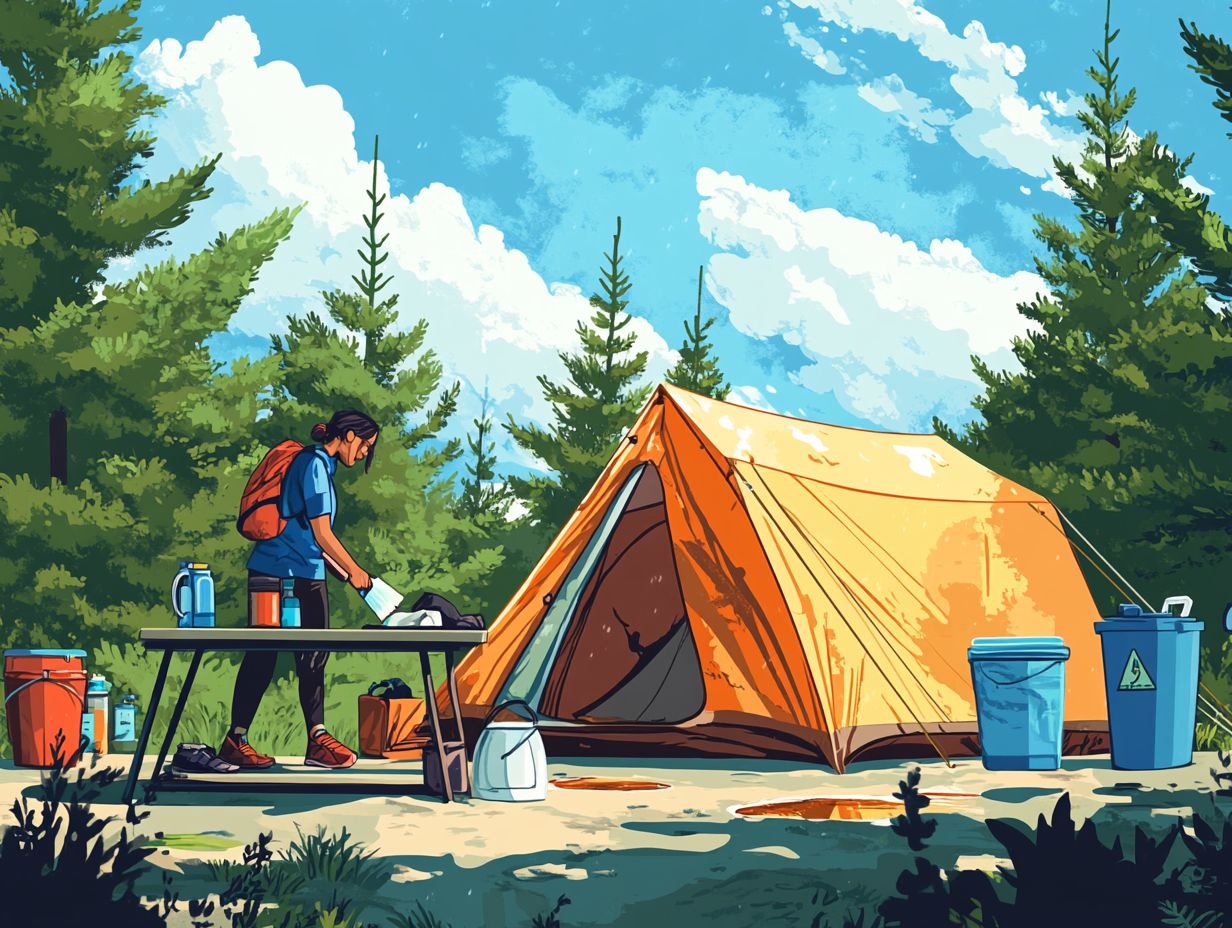
Cleaning your camping equipment is essential for maintaining its longevity and ensuring a safe and enjoyable camping experience.
What should I use to clean my camping equipment?
The best cleaning solution for camping equipment is warm water mixed with mild soap. For deep cleaning, consider specialized solutions like those from Grangers or Sea to Summit. Avoid using harsh chemicals, as they can damage the materials of your gear.
How often should I clean my camping equipment?
It is recommended to clean your camping equipment, including your hiking pack and clean hiking boots, after every use. This will prevent dirt, bacteria, and other contaminants from building up and causing damage.
Can I put my camping gear in the washing machine?
It depends on the type of gear and its care instructions. Most sleeping bags, tents, coolers, and backpacks can be safely washed in a front-loading washing machine on a gentle cycle. Always double-check the care instructions before washing.
Do I need to dry my camping equipment after cleaning?
Yes! It is crucial to thoroughly dry your camping gear, including water jug and kitchen gear, after cleaning to prevent mold and mildew growth. Hang items in a well-ventilated area or use a low heat setting on a dryer.
How do I remove stubborn stains or odors from my camping gear?
If warm water and mild soap don’t do the trick, you can try using a specialized camping gear cleaner or a mixture of vinegar and water. For tough stains or odors, consider taking your gear to a professional cleaner.
Is it necessary to clean my camping equipment before storing it?
Yes, it s crucial to clean and thoroughly dry your camping gear. This is especially important for items like your cooking supplies and hiking boots.
By doing this, you can prevent dirt and moisture from causing damage during storage. Take a few moments to care for your gear so you re ready for your next adventure!

